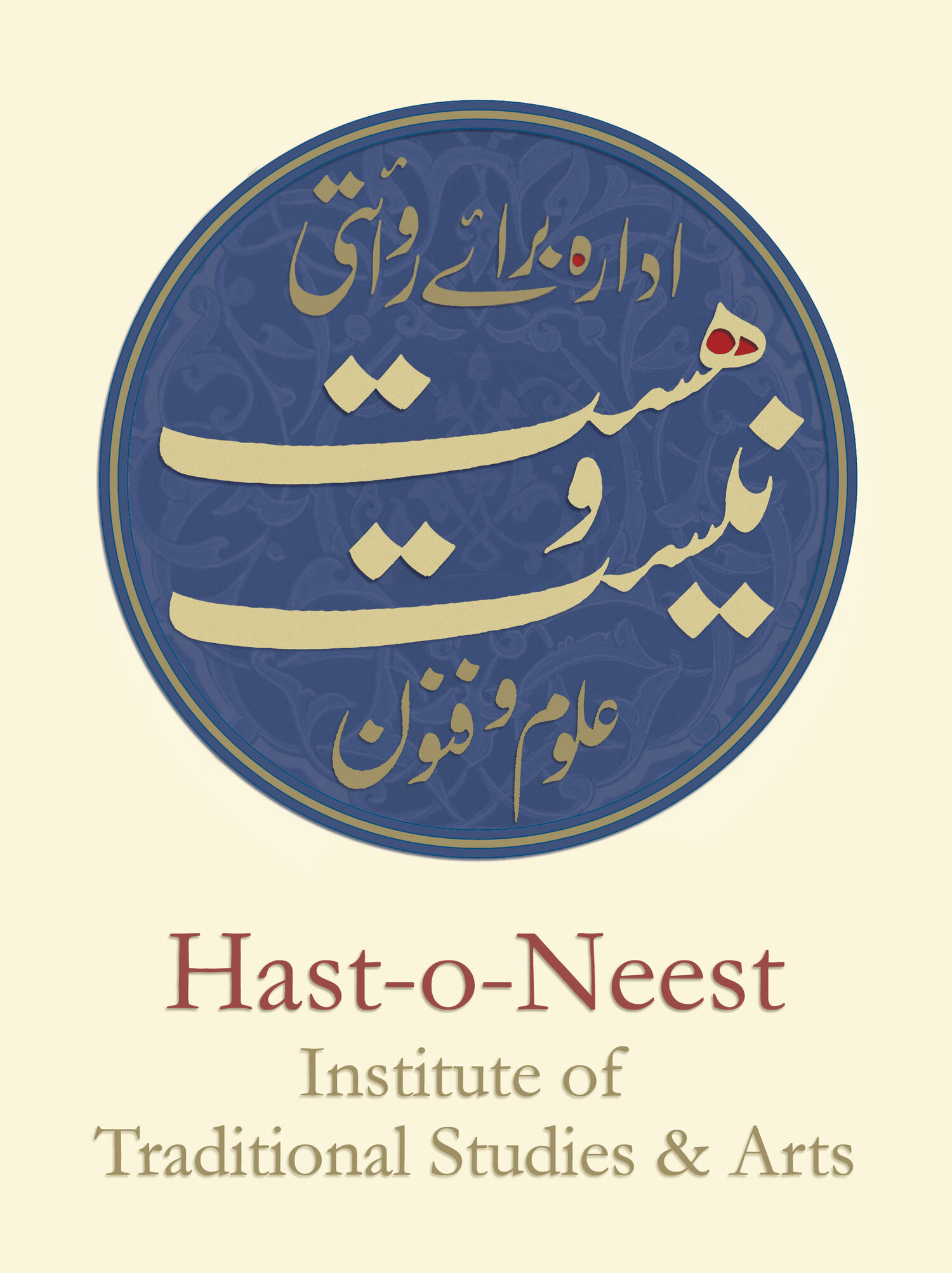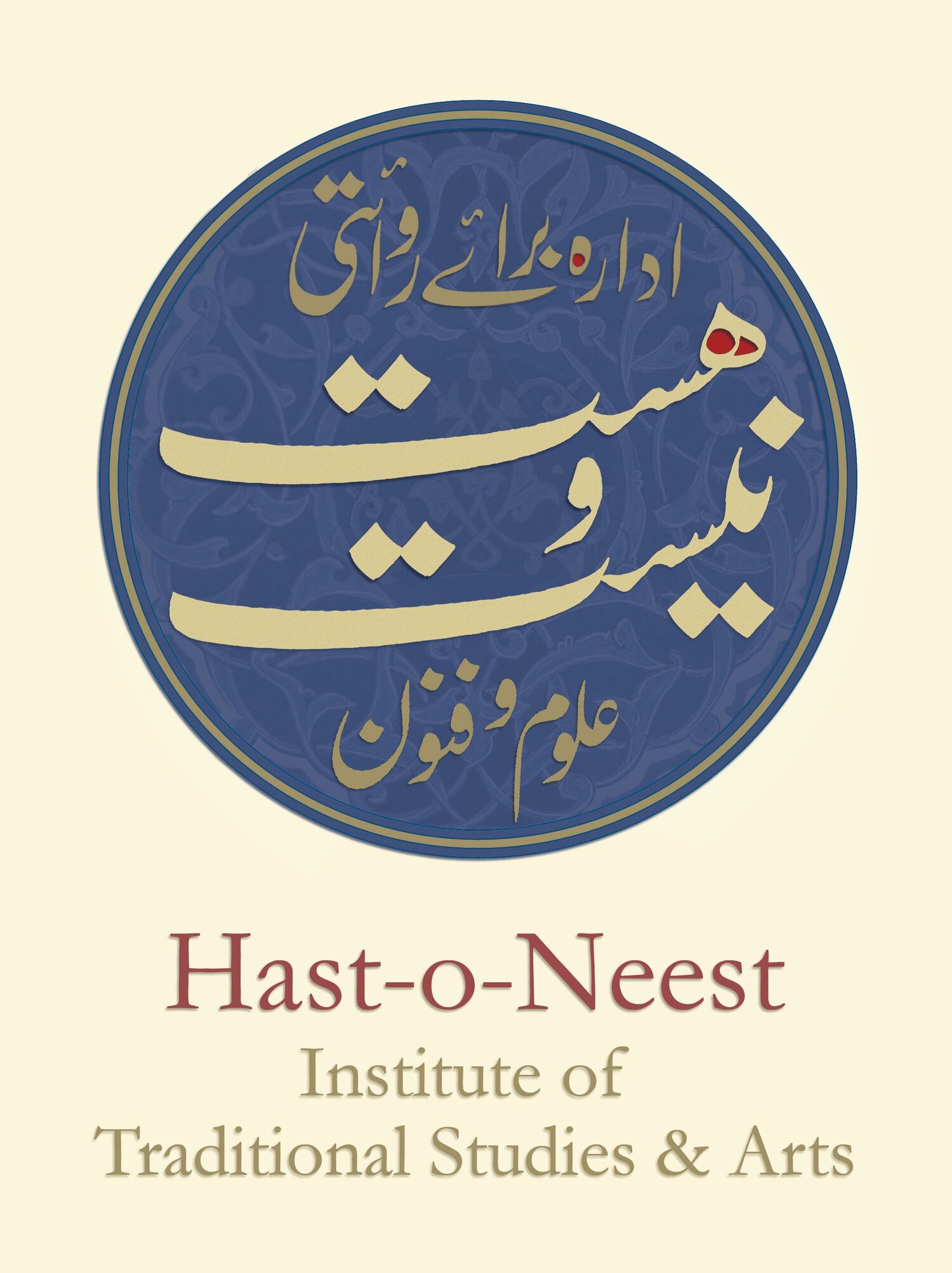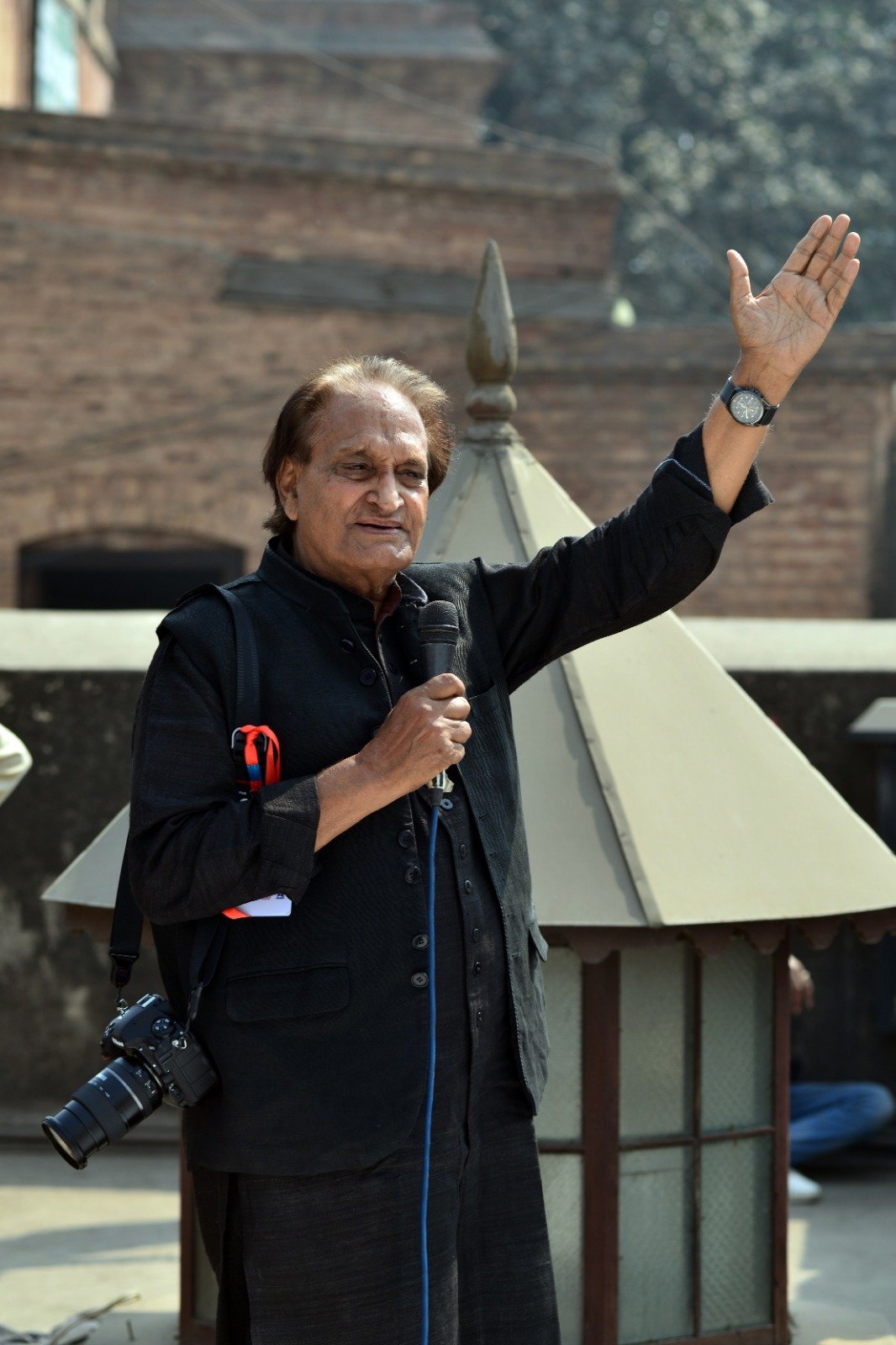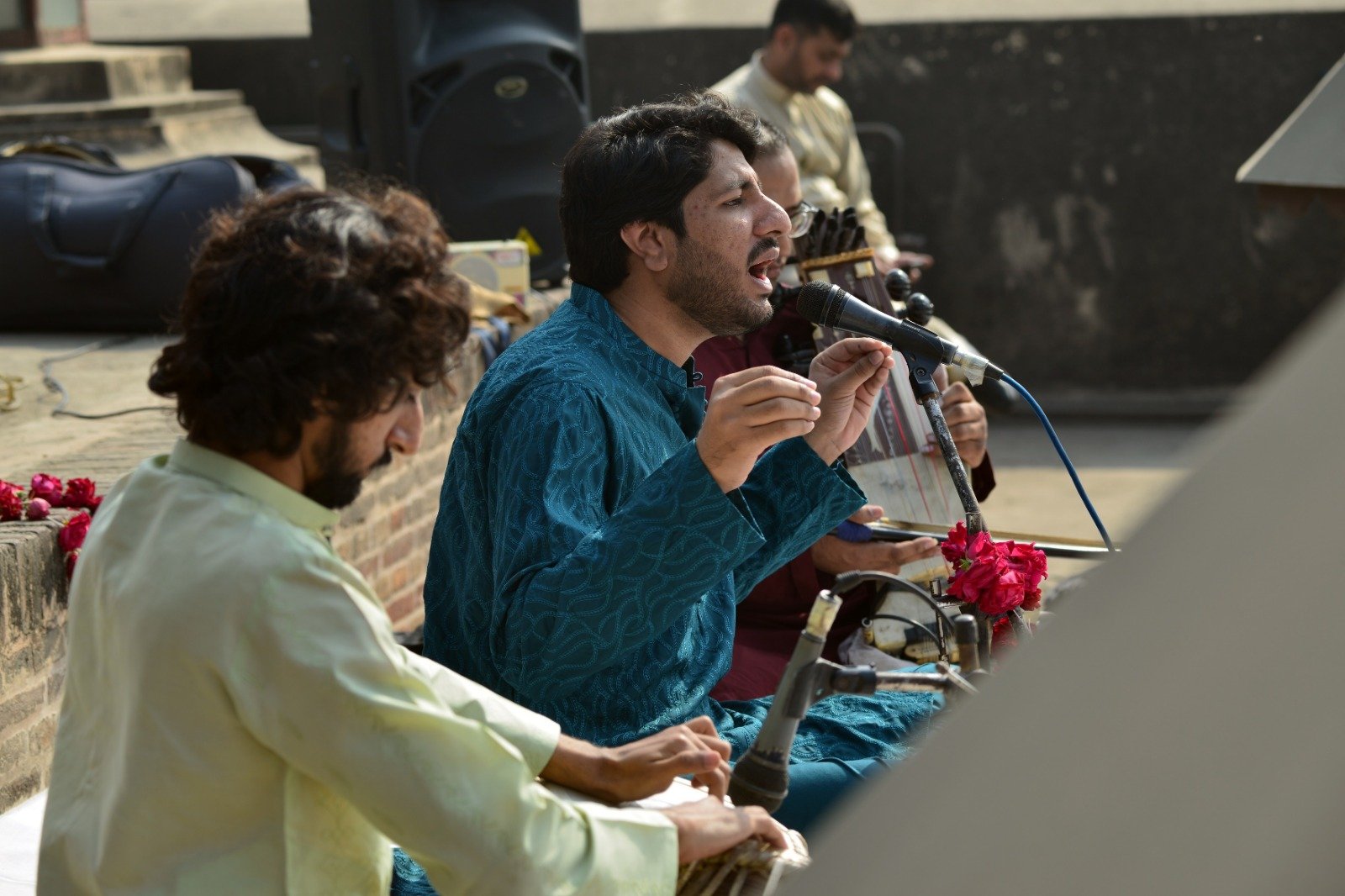
Muslim Shaggan, Gwalior Gharana Shahi Hammam, February 2023
-
Darsgah-e-Mausiqui
Rejuvenating the Ecosystem of Classical Music in Pakistan
Securing the Identity & Creativity of Pakistan’s Musical Future.[1]
[1] Classical Music is the millennial old foundation for all genres of music in the subcontinent.
Introduction
The heritage of Classical Music in Pakistan is rooted in a millennia old tradition of music. Its current form Khayal Gayki was created by Sufi devotees and musicians, in particular Hazrat Amir Khusro (8th C A.D). The essence of this music is devotion to and remembrance of the Almighty and by extension the Auliya. This Classical tradition is foundational to all forms of music in our region, including folk music, light-classical forms like Ghazal and Thumri, devotional music like Qawwali, wedding songs, popular and film music.
The hereditary musicians are the careers of a generational knowledge, both in terms of voice culture and musical knowledge (Raagdari). In addition, they are also careers of unique musical compositions (Bandishes) which are ever fresh musical masterpieces spanning centuries.
-
Training Program in Voice Culture & Raagdari
With Classical Vocalist Chand Khan s/o Late Ustad Hussain Bakhsh Gullo
Hast-o-Neest is proud to inaugurate a vocal training program under its on-going Darsgah-e-Mausiqui initiative. Ongoing since 2022 the initiative has thus far organized seven Takiya Mausiqui concerts in collaboration with Walled City Authoriy of Lahore as well as and three Baithaks (on Oral history and discussing music).
The proposed vocal training program based on the Classical Tradition is planned under the tutelage of Chand Khan.
Chand Khan Sahib is the son of legendary Maestro Late Ustad Hussain Bakhsh Gullu. Chand Khan Sahib’s primary musical lineage (Gharana tradition) goes back to the co-founder of Patiala Gharana ‘Karnail’ Mian Fateh Ali Khan through his grandfather Ustad Nathu Khan Patiala-walay.
Chand Khan’s father Ustad Hussain Bakhsh, trained by Ustad Nathu Khan, subsequently also became a disciples (shagird) of the legendary ustad of the Sham Churasi Gharana, the late Ustad Salamat Ali Khan.
The proposed program consists of three levels:
Monday & Wednesday (6:00 to 8:00pm)
Vocal-I – Beginners* Fee Rs.6,000/- per month
Vocal-II – Mid-Level** Fee Rs.6,000/- per month
*Beginners – Training includes: strengthening the voice, getting to be in tune and becoming proficient in vocal exercises. Introduction to basic rhythm patterns.
**Mid-level – Training includes: Voice Culture, Singing Compositions with Rhythm, Training in Vocal Ornaments, Taans & Sargam patterns.
Saturday & Sunday 10:00 am to 12:00 Noon
Vocal-III – Advance*** Fees Rs.8,000 / month
*** For serious students of Classical Vocal Music.
The aim is to provide a ‘Foundation’ level training of 3-4 years in Classical Vocal singing. This would include Voice Culture, Sur, Paltay, Sargam, Taan, Taal and Singing Bandish & Tarana compositions.
Eligibility: Only students who pass an audition test would be included
Limited scholarships available to talented and deserving applicants.
-
“Classical Music like all forms of traditional art in the subcontinent is taught - & passed on - from teacher to student.
Each teacher represents a lineage, a school & a style.”
“In short, what a teacher carries is something beyond his or herself – it is the cumulative wisdom, knowledge and practical tools of the trade inherited through generations of practitioners. Such musical knowledge is not only unique in world culture but is also priceless and irreplaceable.”
-
Takiya Mausiqi Initiative Institutional Patronage
Walled City of Lahore Authority WCLA Sur Mandal All Pakistan Music Conference-KHI Lahore Music Forum - LMF
-
Takiya Mausiqi Initiative Individual Patronage
Waqar Sheikh (Lahore) Ahmad Hasnain (Allied Marketing Pvt. Ltd.) Ali Habib (Parwana Papers) Omar Saeed (Services Industries) Saqib Razaq (Lahore Music Forum)
-
Contact Email: hast.o.neest@gmail.com Mobile: 92 300 8493170
-
Darsgah - Classical Music Program Requirement:
Interested applicants can apply at anytime of the year.
A classical music background is not necessary for application. Anyone interested can apply.
No age restrictions for adults. Children above 16 Years encouraged to apply.
To Apply | Send full name, academic background details, email address & whatsapp number with a paragraph stating the reason(s) for applying on hast.o.neest@gmail.com or on 03008493170.
Fee Guidelines are provided to enrolled applicants.
A non-profit initiative of the Music Conservatory - Darsgah-e- Mausiqui.
Takiya Mausiqui Classical Music Heritage Initiative
Baithaks, Conversations & Emerging Talent
Takiya e Mausiqui* is a series of regular Baithaks (Concerts) of Classical Music in and around the Walled City of Lahore in collaboration with the Punjab Walled Cities & Heritage Areas Authority (PWCHAA).
-
Takiya Mausiqui Classical Music Heritage Initiative
Baithaks, Conversations & Emerging Talent
Takiya e Mausiqui is a series of regular Baithaks (Concerts) of Classical Music in and around the Walled City of Lahore in collaboration with the Punjab Walled Cities & Heritage Areas Authority (PWCHAA).
The intention is to provide a platform for Classically Trained Musicians with the aim to support and conserve a priceless and irreplaceable part of our cultural heritage.
We envisage this non-profit initiative as the first step towards setting up a Music Conservatory - Darsgah-e-Mausiqui - A project of Lahore Music Forum (LMF), All Pakistan Music Conference Karachi (APMC-Karachi) & Hast-o-Neest - based on the traditional methods of imparting musical training supported by appropriate contemporary technologies and resources where applicable.
The inaugural Takiya Mausiqui baithak was held in November, 2022, Shahi Hammam, Delhi Gate, Androon Lahore with the father-son duo of Ustad Jaggu Khan and Shahid Ali, exponents of the Punjab Gharana of Tabla in Pakistan.
-
Takiya Mausiqi: April 2024
Baithak - Evening Recital
Vocalist & Date to be announced
Time:
About
-
The complete list of performances & conversations held since 2022 at Androon Lahore & Hast o Neest.
-
See images of Takiya Mausiqi performances of 2023 at the Shahi Hammam, Delhi gate, Androon Shehr Lahore, and Conversations at Hast o Neest Lahore.
-
REGISTER FOR A BAITHAK
Registration is required if you are attending a Takiya Mausiqi baithak for the first time.
To register for a scheduled performance, send your full Name, Profession & Mobile number on 03008493170 or hast.o.neest@gmail.com.
If you would like to join the updates group of Takiya Mausiqi, send the above mentioned contact details to the given mobile number or email address.
Contribution & Nazrany ki Riwayat
The contribution for each performance is PKR 500/- per person / per performance -
Payable by bank transfer; if you are registering for the first time - Details of method of payment will be provided.
Payable at the venue gate; if you are already registered once.
(This is the audience’s contribution towards the baithak - a non-profit initiative for classical music performances)
Nazraney ki Riwayat. نذرانے کی روایت. We would like to remind & encourage the participating audience to adopt the practice of bestowing nazrana upon a performing artist whose excellence commands acknowledgement & appreciation.
Thankyou for supporting Takiya Mausiqi!
-
Contact Email: hast.o.neest@gmail.com Mobile: 92 300 8493170
“Classical Music like all forms of traditional art in the subcontinent is taught - & passed on - from teacher to student.
Each teacher represents a lineage, a school & a style.”
“In short, what a teacher carries is something beyond his or herself – it is the cumulative wisdom, knowledge and practical tools of the trade inherited through generations of practitioners. Such musical knowledge is not only unique in world culture but is also priceless and irreplaceable.”
Performance & Conversation List & Links
Baithaks | List & YouTube Links
-
List of Baithaks - YouTube (YT) Links Vocal & Instrumental
The inaugural Takiya Mausiqi baithak was held in November, 2022, Shahi Hammam, Delhi Gate, Androon Lahore
The father-son duo of Ustad Jaggu Khan and Shahid Ali are able exponents of the Punjab Gharana of Tabla in Pakistan.
November, 2022
Tabla Nawaz Shahid Ali | Punjab Gharana | پانچ تال کی سواری پندرہ ماترے Paanch Taal Ki Sawari, Pandrah Matray | شاہد علی طبلہ نواز | Ali Sultan (Harmonium nawaz)
Tabla Nawaz Ustad Jaggu Khan | Punjab Gharana | ایک تال کی سواری Aik Taal Ki Sawari, Peshkar/Qaida/Rela | استاد جگو خان طبلہ نواز | Ali Sultan (Harmonium nawaz)
December 2022
Akmal Qadri, son of legendary Flute maestro late Ustad Saeen Alla-Ditta Qadri is one of the few classical flute players in Pakistan. He is accompanied by his son Nazar Abbas, and his younger son Muzammil Hussain plays the Sarod.
Sarod Nawaz Muzammil Hussain | Raag Bhairavi | مزمل حسین سرود نواز | Asher Shehzad Samuel اشعر شہزاد (Tabla Nawaz)
Bansuri Nawaz Ustad Akmal Qadri & Nazar Abbas | راگ اھیر بَھیرَوْ Raag Ahir Bhairov | استاد اکمل قادری - نذر عباس - بانسری نواز | Asher Shehzad Samuel اشعر شہزاد (Tabla Nawaz)
-
List of Baithaks - Vocal & Instrumental, Shahi Hammam Delhi Gate, Androon Lahore & Conversations at Hast o Neest (Gulberg II Lahore)
You Tube (YT) Links 2023
January 2023
Zohaib Hasan’s family has been playing sarangi for the last three centuries
Zohaib Hassan Sarangi Nawaz | Raag Basant Mukhari (Bhairov Thaat) | زوہیب حسن سارنگی نواز | راگ بسنت مکھاری بھیرو ٹھاٹھ | Kashif Ali Dani Tabla Nawaz کاشف علی دانی طبلہ نواز
Ali Raza Khan, at the age of 5 was given this Sufi instrument by his grandfather - Ustaad Rahim Baksh.
Ali Raza Santoor Nawaz | Raag Mian Ki Todi | علی رضا سنتور نواز | راگ میاں کی ٹوڈی | Kashif Ali Dani Tabla Nawaz کاشف علی دانی طبلہ نواز
February 2023
𝐌𝐮𝐬𝐥𝐢𝐦 𝐒𝐡𝐚𝐠𝐠𝐚𝐧 belongs to the Gwalior gharana of 𝑘ℎ𝑎𝑦𝑎𝑙 𝑔𝑎𝑦𝑖𝑘𝑖. He is the grandson of the great maestro 𝑈𝑠𝑡𝑎𝑑 𝐺ℎ𝑢𝑙𝑎𝑚 𝐻𝑎𝑠𝑠𝑎𝑛 𝑆ℎ𝑎𝑔𝑔𝑎𝑛,
Vocalist 𝐌𝐮𝐬𝐥𝐢𝐦 𝐒𝐡𝐚𝐠𝐠𝐚𝐧 | Gwalior Gharana | Raag Desi Todi | گائِک مسلم شگن | راگ دیسی ٹوڈی
YT Link
Joint March/April Baithak, 2023
Vocalists Nayab Ali & Inam Ali Khan گائِک نایاب علی اور انعام علی خان | راگ باگیشری | Patiala Gharana | Raag Begeshri | Zohaib Hassan Sarangi Nawaz | Asher Shahzad Tabla Nawaz
Short Clip 1 | YT Link
𝗩𝗼𝗰𝗮𝗹𝗶𝘀𝘁𝘀 𝗖𝗵𝗮𝗻𝗱 & 𝗦𝘂𝗿𝗮𝗷 𝗞𝗵𝗮𝗻 گائِک چاند اور سورج خان | راگ بہاگ | 𝐑𝐚𝐚𝐠 𝐁𝐢𝐡𝐚𝐠 | Patiala and Samchaurasi Gharana | 𝐙𝐨𝐡𝐚𝐢𝐛 𝐇𝐚𝐬𝐬𝐚𝐧 Sarangi Nawaz | 𝐀𝐬𝐡𝐞𝐫 𝐒𝐡𝐚𝐡𝐳𝐚𝐝 Tabla Nawaz
May, June & July 2023 CONVERSATIONS
Patiala Gharana - 3 Baithaks Host Taimoor Khan Mumtaz
May | 𝐵𝑒𝑔𝑖𝑛𝑛𝑖𝑛𝑔𝑠 & 𝐴𝑠𝑡ℎ𝑎𝑖/𝐵𝑎𝑛𝑑𝑖𝑠ℎ | Chand Khan & Nayab Ali Khan
June | 𝐹𝑜𝑢𝑛𝑑𝑒𝑟𝑠 & 𝐵𝑎𝑛𝑑𝑖𝑠ℎ | Salman & Ali Amjad Amanat Ali Khan
Short Clip 1 | How can a listener begin to appreciate classical music? | YT Link
Short Clip 2 | YT Link
July | 𝐶𝑜𝑚𝑝𝑎𝑛𝑦 𝑜𝑓 𝐸𝑙𝑑𝑒𝑟𝑠 | Sultan Fateh Ali Khan & Salman Amanat Ali Khan (Rustam Fateh Ali Khan was unavailable)
-
February 2024
"𝐅𝐚𝐡𝐞𝐞𝐦 𝐌𝐚𝐳𝐡𝐚𝐫 started his training in Classical music at ten years of age, he had the privilege of being a student of classical gurus like Ustad G.A.Farooq, Ustad Pervaiz Paras and Ustad Chote Ghulam Ali Khan.”
𝐼𝑛 𝑚𝑒𝑚𝑜𝑟𝑦 𝑜𝑓 𝐿𝑎𝑡𝑒 𝑈𝑠𝑡𝑎𝑑 𝑅𝑎𝑠ℎ𝑖𝑑 𝐾ℎ𝑎𝑛 𝑅𝑎𝑚𝑝𝑢𝑟-𝑆ℎ𝑎ℎ𝑎𝑠𝑤𝑎𝑛 𝐺ℎ𝑎𝑟𝑎𝑛𝑎 | تکیہ موسیقی | گائک فہیم مظہر | راگ پوریا کلیان | 𝗩𝗼𝗰𝗮𝗹𝗶𝘀𝘁 𝐅𝐚𝐡𝐞𝐞𝐦 𝐌𝐚𝐳𝐡𝐚𝐫 | 𝐑𝐚𝐚𝐠 𝐏𝐮𝐫𝐢𝐲𝐚 𝐊𝐚𝐥𝐲𝐚𝐧 | 𝑈𝑠𝑡𝑎𝑑 𝑃𝑎𝑟𝑣𝑒𝑧 𝑃𝑎𝑟𝑎𝑠 𝐻𝑎𝑟𝑚𝑜𝑛𝑖𝑢𝑚 𝑁𝑎𝑤𝑎𝑧 | 𝐴𝑛𝑖𝑙 𝑊𝑎𝑞𝑎𝑠 𝑇𝑎𝑏𝑙𝑎 𝑁𝑎𝑤𝑎𝑧 | 𝐻𝑜𝑠𝑡𝑒𝑑 𝑏𝑦 𝑀𝑎𝑘ℎ𝑑𝑜𝑜𝑚 𝐴𝑚𝑚𝑎𝑟 𝐴𝑧𝑖𝑧, 𝑆𝑢𝑟 𝑀𝑎𝑛𝑑𝑎𝑙
Clip | 𝐂𝐨𝐦𝐦𝐞𝐧𝐭 | 𝑪𝒍𝒂𝒔𝒔𝒊𝒄𝒂𝒍 𝑴𝒖𝒔𝒊𝒄 𝒊𝒏 𝑷𝒂𝒌𝒊𝒔𝒕𝒂𝒏
"... 𝑎 𝑙𝑖𝑠𝑡𝑒𝑛𝑖𝑛𝑔 𝑎𝑢𝑑𝑖𝑒𝑛𝑐𝑒 & 𝑎 𝑤𝑒𝑙𝑙-𝑐𝑢𝑟𝑎𝑡𝑒𝑑 𝑝𝑙𝑎𝑡𝑓𝑜𝑟𝑚 𝑎𝑙𝑙𝑜𝑤𝑠 𝑡ℎ𝑒 𝑎𝑟𝑡𝑖𝑠𝑡 𝑡𝑜 𝑡𝑎𝑘𝑒 𝑡ℎ𝑒 𝑙𝑖𝑠𝑡𝑒𝑛𝑒𝑟 𝑎𝑙𝑜𝑛𝑔.." 𝑼𝒔𝒕𝒂𝒅 𝑭𝒂𝒉𝒆𝒆𝒎 𝑴𝒂𝒛𝒉𝒂𝒓
دراصل یہ عبادت کا کام تھا۔ آرٹسٹ کو کیا چاہیے سامعین سے۔ ہمیں گانے کے مواقعے بہت کم ملتے ہیں۔ آپ لوگوں کا ہمارا ساتھ رہے گا تو بات آگے بڑھے گی ۔ کرسی پہ بیٹھ کے سننے کا رواج نہی ہے۔ یہ گانا نشستی ہے ۔ یہی ماحول ہونا چاہیےـ استاد فہیم مظہر، تکیہ موسیقی، برکت علی ہال، لاہور فروری ۲۰۲۴
March 2024
Salman Hyder Khan received his initial training from his father Ustad Muhammad Saleem Khan and later from Pandit Varail Das who was a Shagird of the Gwalior Gharana. Currently he is learning from Pandit Ajoy Chakarborty, an exponent of the Patiala-Kasur Gharana.
Venue: Shahi Hammam was built in 1634 by the Governor of Lahore Hakim Ilm ud Din Ansari - during the reign of Mughal Emperor Shah Jahan - for general use, for travelers & locals of the area. It had 21 interconnected chambers that consisted of three parts; the Jama Khana for dressing; Nim Garam Hammam & Garam Hammam; segregated with a reception chamber & a small prayer room - https://architecturaltimes.news/shahi-hammam/
𝗩𝗼𝗰𝗮𝗹𝗶𝘀𝘁 𝐒𝐚𝐥𝐦𝐚𝐧 𝐇𝐲𝐝𝐞𝐫 𝐊𝐡𝐚𝐧 | 𝐑𝐚𝐚𝐠 𝐆𝐮𝐣𝐫𝐢 𝐓𝐨𝐝𝐢 | گائک سلمان حیدر خان راگ گوجری ٹوڈی | 𝐺ℎ𝑢𝑙𝑎𝑚 𝐻𝑢𝑠𝑠𝑎𝑖𝑛 𝐿𝑎𝑙𝑖 𝐻𝑎𝑟𝑚𝑜𝑛𝑖𝑢𝑚 𝑁𝑎𝑤𝑎𝑧 | 𝐴𝑠ℎ𝑒𝑟 𝑆ℎ𝑎ℎ𝑧𝑎𝑑 𝑇𝑎𝑏𝑙𝑎 𝑁𝑎𝑤𝑎𝑧 | 𝐻𝑜𝑠𝑡𝑒𝑑 𝑏𝑦 Taimoor Khan Mumtaz
Takiya Mausiqi provides a platform for - classically trained - musicians to support & conserve a priceless, & irreplaceable, part of our cultural heritage.
Baithaks
Baithak | March 2024
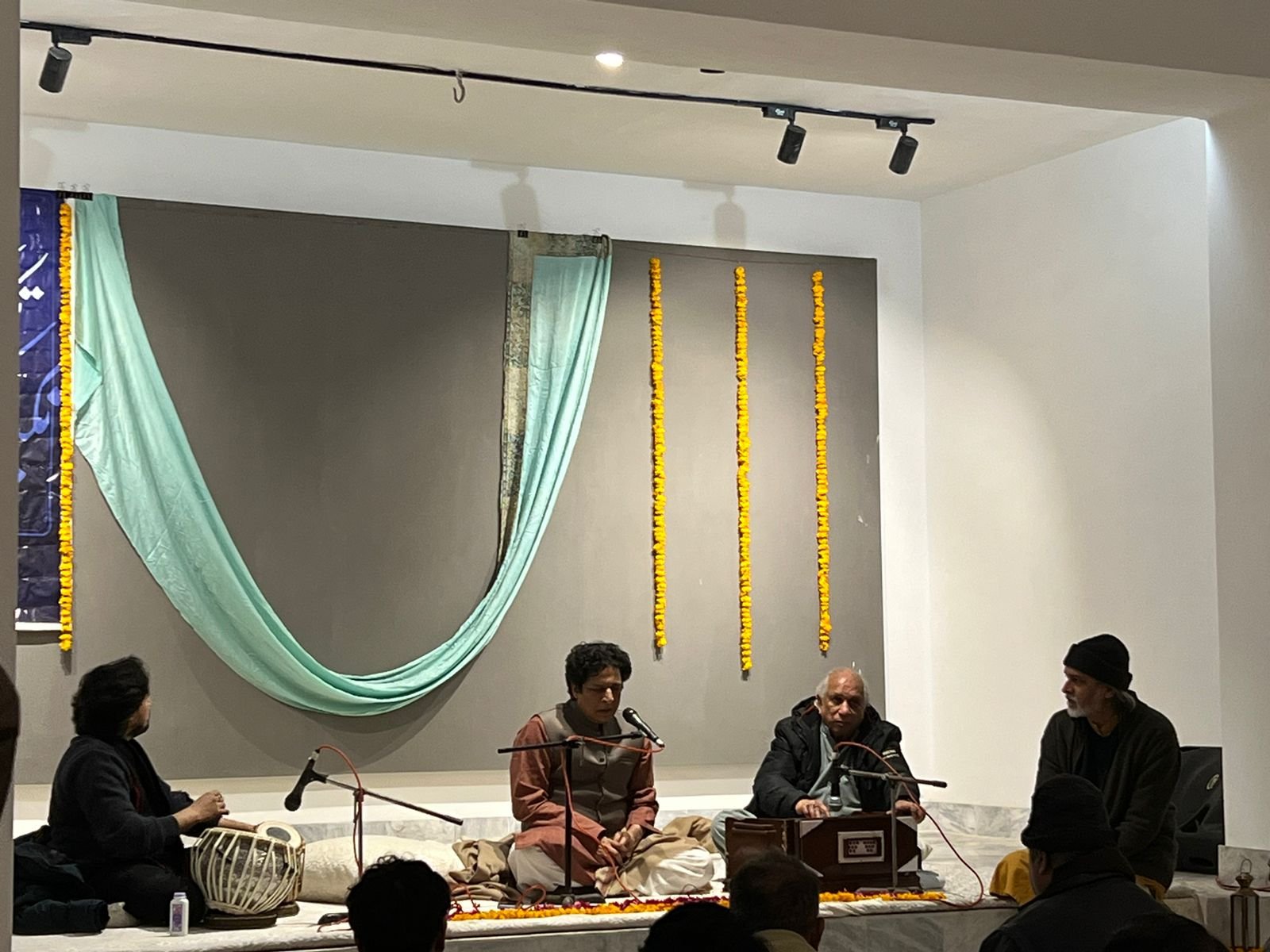
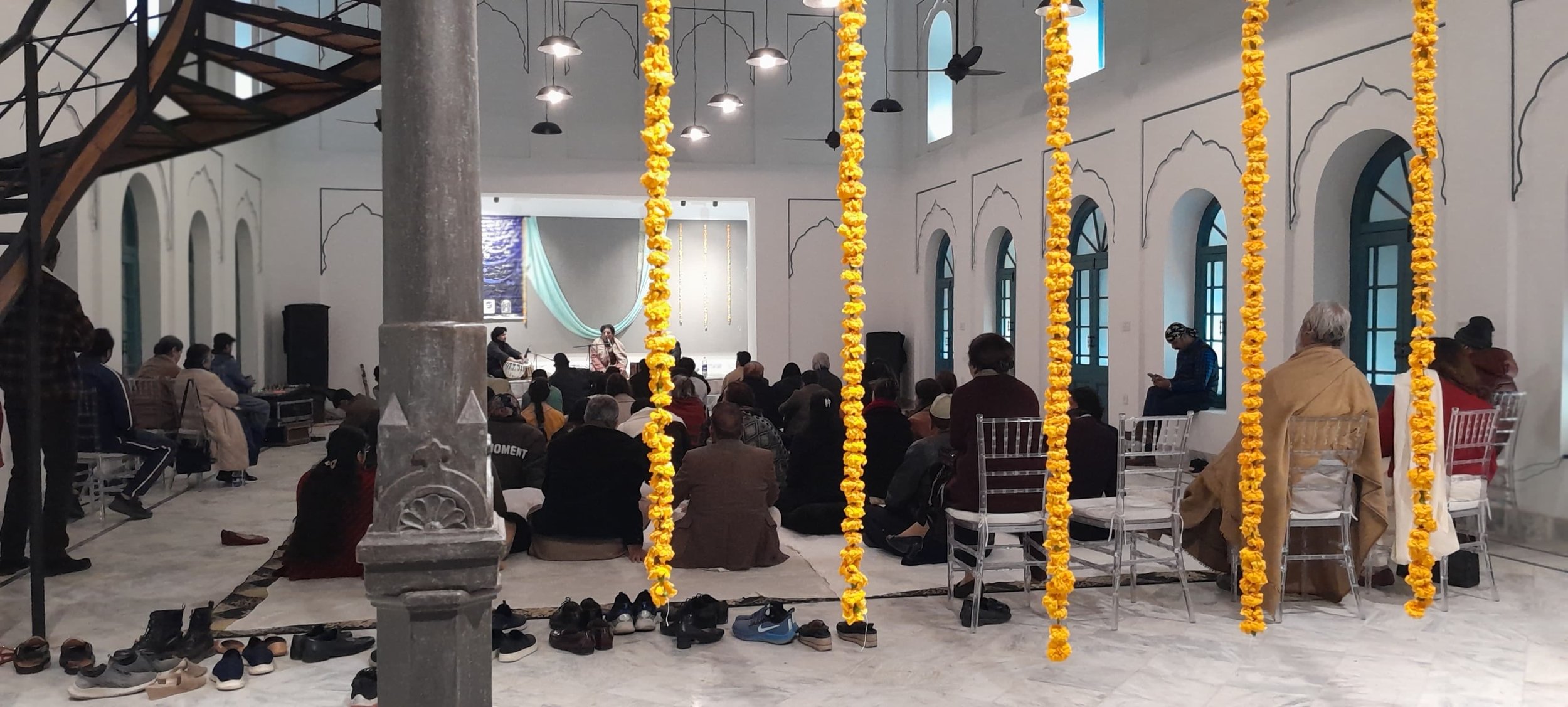
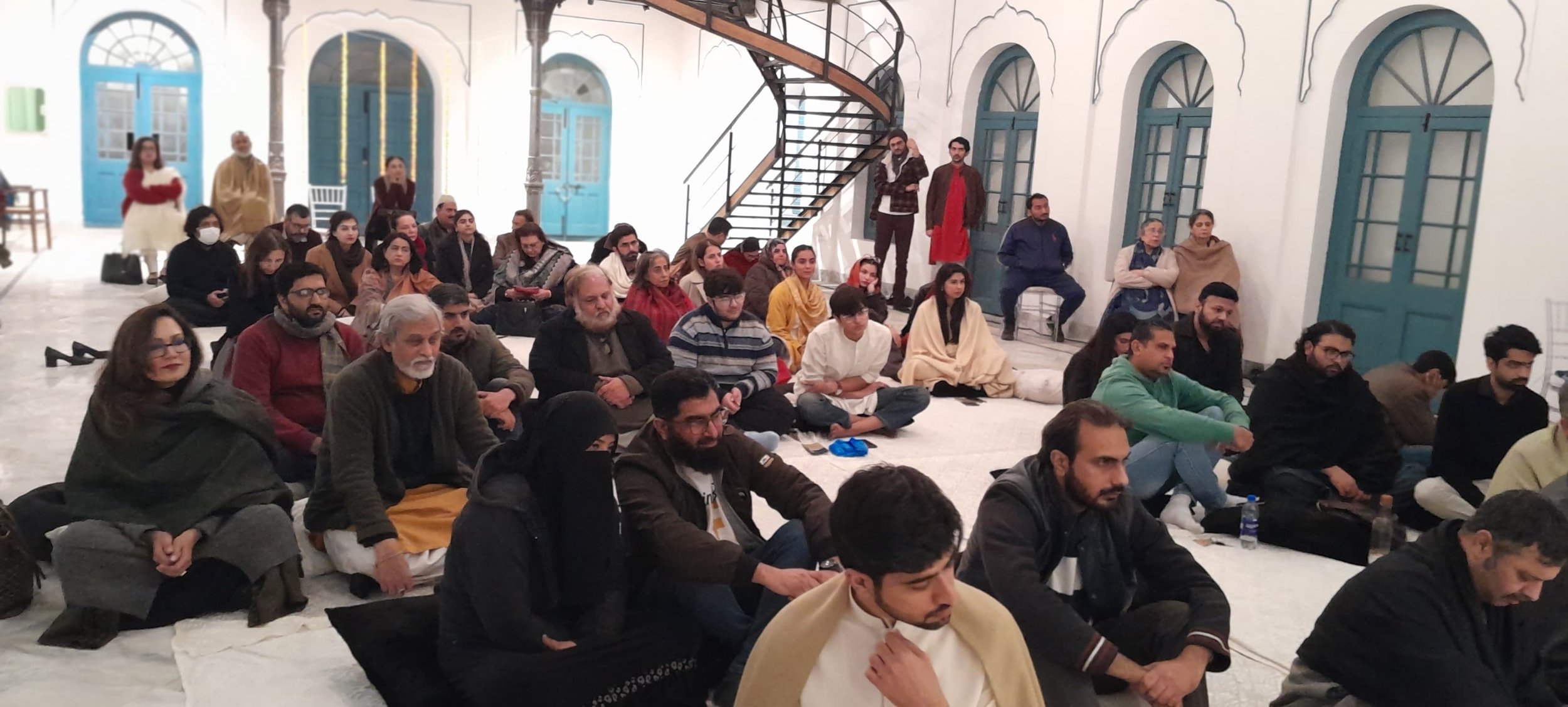
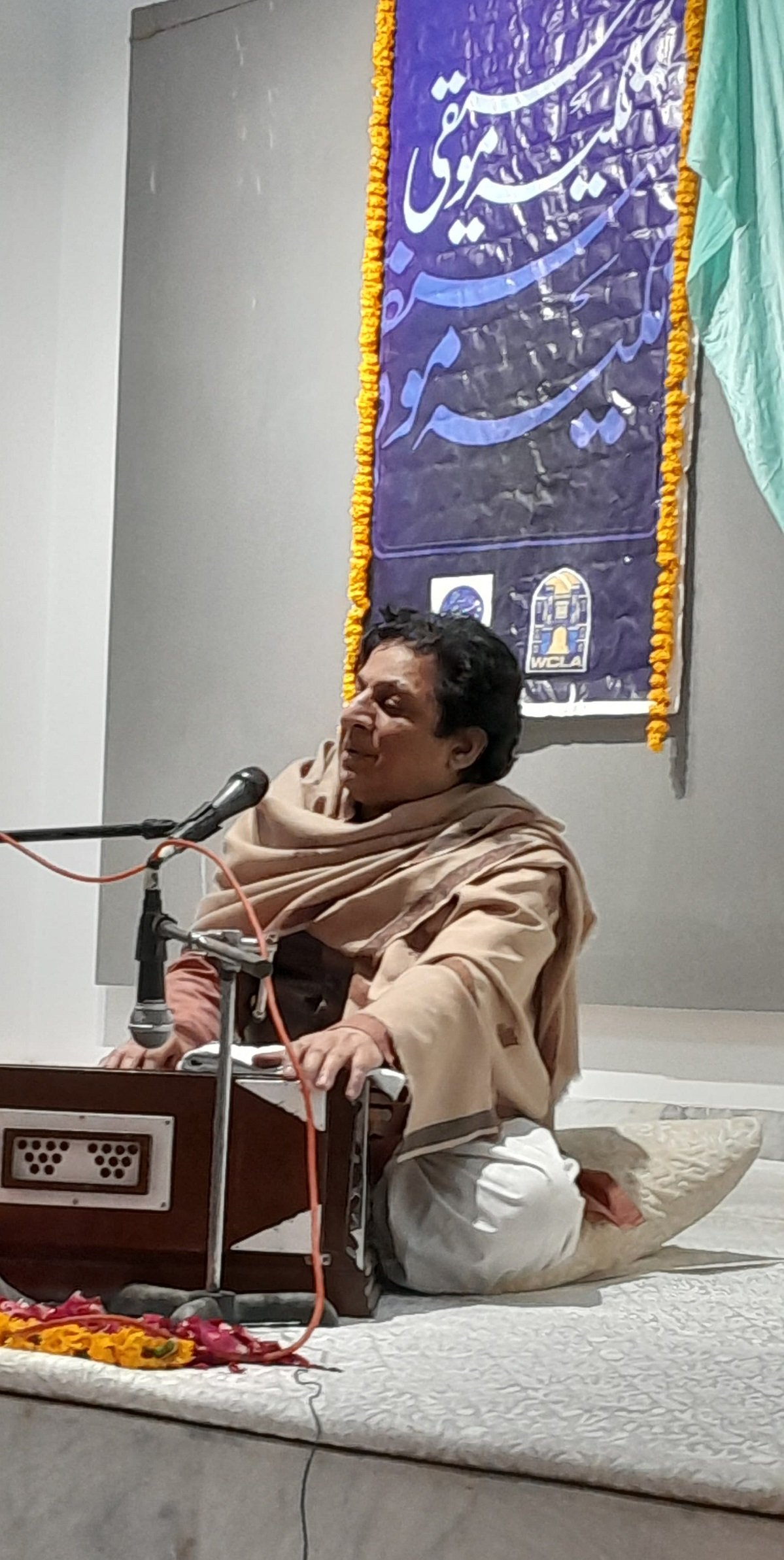
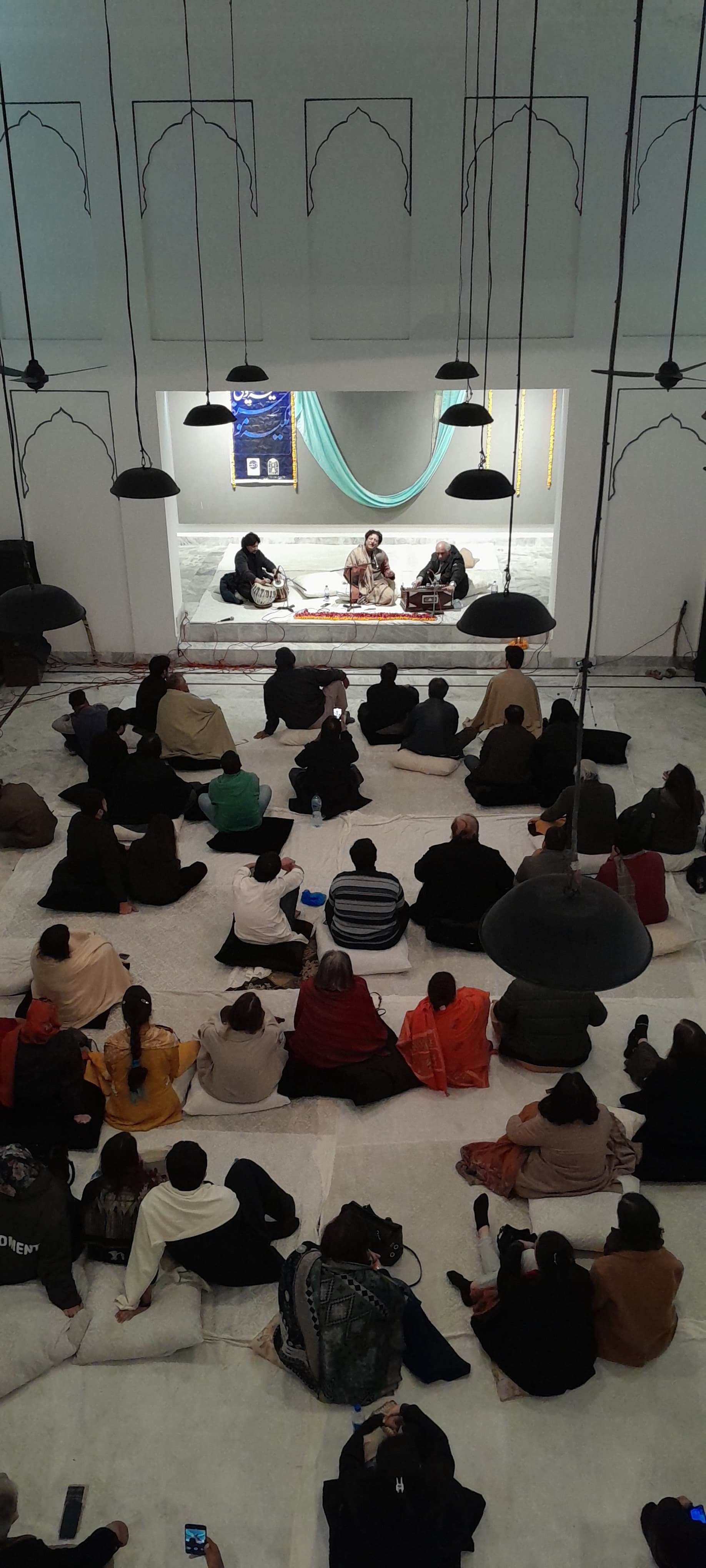
Gallery
Conversations & Performances | 2022 +
Images: M. Arshad Khan facebook/zumafirstnamekhan
Classical Music
Story
The Story of Classical Music in the Subcontinent
‘The periods of the Delhi Sultanate (1206 – 1526) and even more so the following Moghul rule (1526 – 1858) opened up a wide range of spaces of deep cultural interaction between the Iranian and the Indian world in North and Central India. Mediated by the courts and by waves of immigration from the Near East and Central Asia, Persian language and the culture it incorporated went much beyond the courts. They left their imprint on a wide range of the complex layers of Indian culture.
Particularly the Moghul Empire turned into a hot spot of cultural cross-fertilization of the Indian and the Iranian.
‘What is conveniently called Hindustani music is an offspring from the meeting of Persian and Indian traditions.
The core of what goes as North Indian classical music in our age was formed and standardized in the epoch of the so called Muslim rule in India: the melodic models, the rhythms, the instruments, the ways of learning, transforming and continuing of traditions are either innovations or progressive developments made during the Muslim epoch ….
‘The musical and musicological traditions of the Indian subcontinent are as old as South Asian culture itself is, but our knowledge of Indian musical traditions beyond the beginning of Muslim rule is rather limited. Of course, there is an old musicological tradition that is usually ascribed to the mythical sage Bharata, the author of the most famous antique treatise on performing arts, and his Nāṭyaśāstra, which was perhaps composed or even edited as early as the second century BC...’
Foreword: Shams al-Aṣvāt - The Sun of Songs by Ras Baras (An Indo-Persian music theoretical treatise from the late 17th century), Critical edition, translation by Mehrdad Fallahzadeh & Mahmoud Hassanabadi, Uppsala University, Uppsala, Sweden, 2012.
Classical Music of the Subcontinent is one of the oldest musical traditions of the world.
Believed to have been a gift from Heaven – in the form of the treatise Natya Shastra to the sage Bharat Muni. Natya Shastra has also been called the 5th Veda and Music as one of the shortest paths to God realization.
A very similar approach to spiritual music was cultivated in Islamic Civilisation. Where its mystical heart, Tasawwuf / Sufism looked upon Music as a means to approach God as indicted in the title quotation from the great theologian and mystic Imam Ghazali.
The leading form of Classical Music ‘Khayal’ is said to be Hazrat Amir Khusrau’s creation. Prior to the 18th C it remained constrained to Khanqas and Sufic gatherings.
The other Classical form par-excellence, Dhrupad, came to prominence in Emperor Akbar’s court. Dhurpad which is a more somber and contemplative style remained strong into the 19C but was eclipsed by Khayal from the 18C onwards.
The Dhrupad Tradition
Similar to great sciences as Yoga or Ayurveda, Dhrupad or Dhruva Pada has been in practice since 1st Century B.C, with its origin in the Vedas.
Vedic knowledge is primarily an oral tradition, of which Dhrupad is an integral part.
The word Dhrupad is the Hindi form of the original Sanskrit, Dhruvapada, a combination of;
Dhruva = structured/unmoving
Pada = word/poem.
